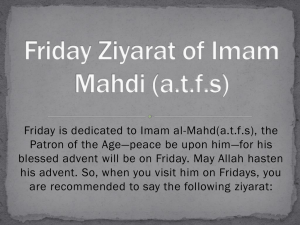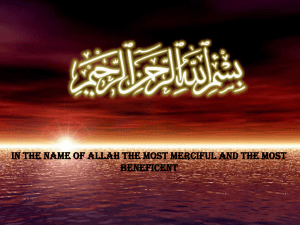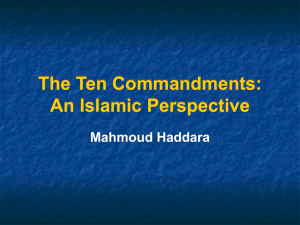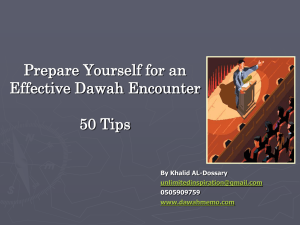Believing In Qada (Decree) And Qadar (Destiny), Pillars Of Faith
advertisement
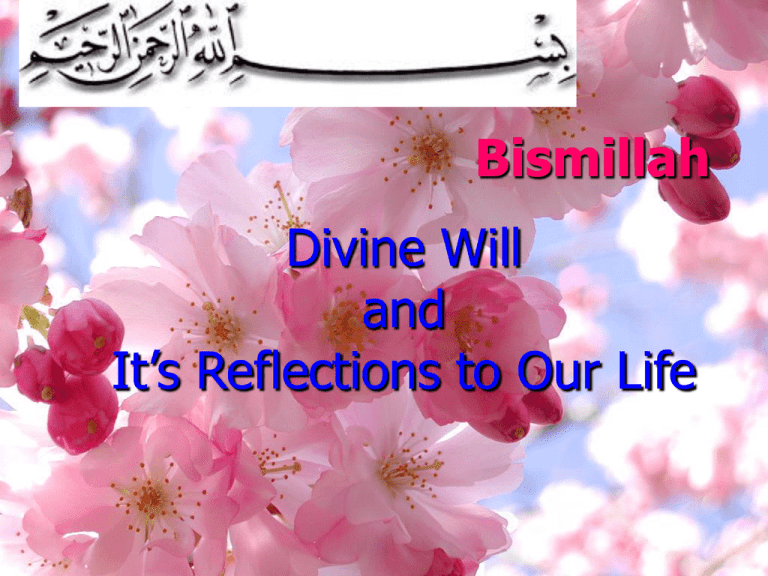
Bismillah Divine Will and It’s Reflections to Our Life Belief Principles • God (Allah) • Revealed Messengers • Day of the Judgment • • • (BELIEVEING IN HEREAFTER) Angels Revealed Books Pre-destination (Divine Will) Qada (Decree) and Qadar (Destiny) Outline • Terms • 4 Pillars of Divine Will • Questions and Answers Divine Will Destiny “Verily, We have created all things with Divine Will.” [Qur'an 54:49] Allah knows with His eternal knowledge every aspect and every condition, time and place, attributes and qualities of everything that happened or will happen from the pre-eternity to the past-eternity and His ordaining them accordingly. Decree (Qada) His creation of things and events when their time is due based on His pre-eternal knowledge and ordaining. "(Allah) The Originator of the Heavens and the Earth. When He decrees a matter, He only says to it: 'Be!' - and it is. [Qur'an 2:117] Preserved Tablet (Lahw-i Mahfoos) Divine book in which the things that happened and are to happen, all moments in time and all beings in space, in short, everything is written on. The little sample of the Preserved Tablet in man is memory. Irada al-juziyya (partial free will) Free will of man that can wish only one thing at a time and that cannot be related to two things at the same time. ELEVATOR Example: Irada al-juziyya (partial free will) DO NOT GO GO The Ship belongs the King. The Captain can say that “He maneuvers the ship” Because the Captain chooses the path on which the ships sail. But the Captain can not say that He is sailing all by himself and by his capabilities. Because he does not own the ship nor sea. Island on the Left Island on the Right Every ship resembles a person in this life. Right path ------- True path ordered by Allah(cc) ------- Paradise Left path ------- Disobedience, Wrong paths ------- Hell The harbor is the our world All Instruments of the ship are organs and senses of the person Maneuvering the ship represents Partial Free Will (Irada al-juziyya ) Kasb (acquiring, gaining) To tend toward a deed and to decide to do it. It is said that kasb affects the quality of the deed, not the deed itself. That is, when the human will intends to do a deed, it affects the good or bad quality of that deed, not the creation of it. Khayr and sharr (good and bad deeds) Khayr (good deed) means that a deed, a state or a thought complies with the divine consent. Sharr (bad deed) means that a deed, a state or a thought belongs to the zone forbidden by Allah. Man is tested to use his partial will to choose one of those opposite poles and to intend to do one of them. Whatever man chooses to do the good or bad deed; it is Allah who creates that deed because there is no Creator (Khaliq) other than Him. Divine Will and Predestination 1. Belief in the all-encompassing knowledge of Allah: He knows what was and what is yet to come; with regard to that which does not happen, if it were to happen, He knows how it would be. He knows what exists and what does not exist. All-encompassing knowledge of Allah Eternal Knowledge Of ALLAH (cc) Time Line Past Present Future By chance or by pre-knowledge Every working system requires a design and preknowledge Knowledge and Power Table Letter Painting Everything shows its Maker and Owner Carpenter Writer Artist Allah says: "The All-Knower of the Unseen not even the weight of a small ant or less than that or greater escapes His knowledge in the heavens or the earth but it is in a clear book (The Preserved Tablet)" [Qur'an 34:3] Unique IDs refers to ONE FL DMV ---> ---> ? Four Pillar of Divine Will and Predestination 2. Belief that Allah has written everything in Preserved Tablet: Allah wrote everything in a book called The Preserved Tablet. The Messenger (peace be upon him) said: "The first thing which Allah created was the Pen. He (Allah) said, ' Write!' It said, 'What shall I write?' He said, 'Write the decree of what has happened and what is to happen for all eternity.‘ "Allah says: "Have you not known what Allah knows what is in the heaven and the earth? Indeed this is all in a Book. This is indeed easy for Allah." [Qur'an 22:70] Four Pillar of Divine Will and Predestination 3. Belief in the irresistible will and perfect power of Allah: This principle implies the belief that the will of Allah is unstoppable and that His power is Allencompassing. Whatever Allah wills, it happens, and whatever He does not will does not happen. Nothing can move or come to a halt in the heavens or on earth except by His Will, and nothing happens in His Dominion except what He wills. Allah says: "Verily, His Command, when He intends a thing, is only that He says to it, 'Be!' - and it is!" [Qur'an 36:82] Four Pillar of Divine Will and Predestination 4. Belief that Allah is the creator of all things: Allah, the All-Powerful, is the Creator of all things. He is the One Who created, formed and brought His creation into being. He is the Creator and everything besides Him is subject to His dominion and control and is created by Him. Allah says: "Allah is the Creator of all things.“ [Qur'an 39:62] Correct belief of Divine Will and Predestination Allah is the Creator of all things. What He wills happens, and what He does not will does not happen. Allah sends astray whomsoever He wills, and He guides whomsoever He wills. People have their own will and freedom to choose, so they do by their own will and power that which Allah enables them to do. "We have shown him the right path, whether he be grateful or ungrateful." [Qur'an 76:3] "Indeed he succeeds who purifies his own self And indeed he fails who corrupts his own self" [Qur'an 91:9-10] Questions Are we victims of Destiny? Do we have any part in the calamities befalling us? No one is a victim of Destiny. God does not destine our acts; rather, He creates whatever we will to do. Destiny's decrees or verdicts are based on Its consideration of our free will. We are directly responsible for whatever happens to us. If we experience misfortune, it is either because we have misused our free will or because, as with Prophets, God wills to promote us to higher ranks. For example, the sun is absolutely necessary for and indispensable to life. If we stay outside too long and die of sunstroke, can we blame the sun? Of course not, for we could have gone inside or taken sufficient precautions. In the same way, our free will (not Destiny) is responsible for any misfortune that comes our way. Blaming Destiny only causes the misfortune to worsen. In the Glorious Quran it is said: He whom Allah guides is rightly guided; but he whom Allah leaves to stray,- for him wilt thou find no protector to lead him to the Right Way. (Al-Kahf Surah, 18:17). Does it mean that God forces man? There are two alternatives in this question: 1. Does it happen however, God Almighty wills with His universal and all-encompassing will 2. Does man choose with his own will? The verse in this question is as follows: "Man yahdillahu fala mudilla lah. Va man yudlil fala hadiya lah: He whom Allah guides is rightly guided; but he whom Allah leaves to stray, - for him wilt thou find no protector to lead him to the Right Way. (Al-Kahf Surah, 18:17) Literally, guidance means the right path and the path the prophets stuck to. And straying means the way of the aggressors, losing the right path and straying from the right path. If attention is paid, it will be seen that both of these are each a deed and act, and in relation to man, each a function. For this reason, both of these must be attributed to God. As was stated before, every deed is created by God. There is no deed outside of the will of God. The creator of straying from the right path with the reflection of the name Mudhell- The Disgracer, The Dishonorer and the creator of guidance with the reflection of the name Hadi- The Guide is God Almighty. Both of them are given by God. But it does not mean that without any interference or connection of the slave, by force he is led astray or is rightly guided by God and he becomes either an aggressor or a trustworthy person. This issue can be understood following way: It is wrong to attribute the deed of guidance and straying to man, because the real possessor is God and this deed must surely be attributed to the possessor. The amount of the deed does not change this fact; for example, if this deed weighs ten tons, even one tenth of it must not be attributed to man. The real possessor is God and this deed must surely be attributed to its possessor. Knowledge of Allah does not force persons choice and does not eliminate his will and freedom by any means. And say, "The truth is from your Lord, so whoever wills - let him believe; and whoever wills - let him disbelieve." Surat Al-Kahf 18:29 Question Is Believing in destiny (qadar) compulsory to be a Muslim ? Yes. Qur’an clearly declares this belief principle Question Is Allah (cc) bound with time and place? Allah is not bound with time place. Time and place are creatures of Allah. ALL-ENCOMPASING KNOWLEDGE OF ALLAH (c.c.) PAST PRESENT FUTURE Destiny is not a knowledge from the past time. Destiny is a knowledge that is not dependent on the time. Because Allah is not bound by the time. An example to understand Allencompassing knowledge Imagine seeing things without boundaries of time and place! QUESTION Since Allah knows everything that will happen in pre-eternity, is it not true that He forces us to do that thing? No. The fact that Allah knows His slave will do something has no forcing effect on the deeds of that person. Example: Suppose we know that there will be a lunar eclipse one year later as a result of the astronomic researches. When the lunar eclipse takes place when its time is due, does it mean that the lunar eclipse took place because we knew it. No, because the lunar eclipse did not take place since we knew it; it took place depending on the causes of the eclipse. We discovered those causes one year earlier thanks to scientific researches. The lunar eclipse did not take place because we said there would be a lunar eclipse. OUR KNOWLEDGE KNOWN FACT Knowledge depend upon facts and actual known realities. OUR KNOWLEDGE REALITY / FACT The Apple on the table is an apple. Not because we know that it is apple. If we knew or thought that it was a watermelon, it would not have been an a watermelon An experienced teacher knows who will get good grades and who will get bad in the beginning of an educational year. Driver 1 Writer Driver 2 Knowledge depend upon facts and actual realities. KNOWLEDGE FACT, EVENT QUESTION What does Islam say about "luck"? Islam has never let people be in a hole. It has not allowed them be drifted by worthless things and thoughts whose essences are not known. There is no place for the words such as “luck and chance” in Islam. In our religion, there are “destiny and reliance on Allah and consenting to what comes from Allah.” And the source of them is faith. The believing person has faith in Allah; he surrenders to fate and he is saved from getting confused before the events and he overcomes anything he meets by the force and light of the faith. QUESTION What are the benefits of believing in Divine Will and Decree? A person who has strong faith; he has a courage that can “challenge the whole universe”. He believes that he has a Lord who has created him out of nothing; who has prepared the world and has bestowed him bounties such as life, health and peace. Allah keeps the control of not only the earth but also the sun and the billions of stars and the universe. Besides knowing that his Creator has not created him in vain, he also knows that He has not left him in a hole as a plaything of “chance.” He has the belief that his life, minutes and seconds passing from the time he comes to the world to the time of his death have been known, programmed and determined by Allah. A believer perceives that good things or bad things happening to him are under the knowledge and control of Allah. He always tries and searches all means and causes and then he puts his trust in his Creator who knows and thinks him better than himself in the end and expects the result from Him. He feels comfort and consents to the happening of whatever exists in the Divine program. BURDEN FEAR A Non believer does not trust in Allah. He does not rely on a Power. What happens in the end? He ends up with “begging before all of the universe”. Feeling weak before the things, he regards as difficult. “Trembles before every event”; from “pride”, namely, supposing that he is the owner of beings; from “making a fool of himself”; from “misery in the hereafter”, namely, losing the eternal life, and from “the prison of the pressures of this world”. “He who believes in Divine Will (qadar) becomes free of grief.” In Difficult Times He thinks that the trouble he is suffering will be kaffarah (a reason for forgiveness) for him, and shows patience and endurance. In Good Times He thanks to his Lord 2 Golden Rules 1. Thanking for blessing of Allah increases the blessings. 2. Cursing during the calamity makes it worse. Patience will be rewarded.






